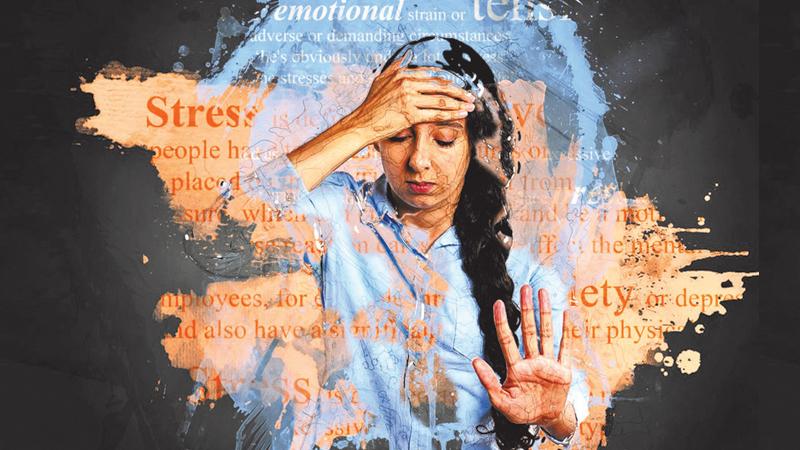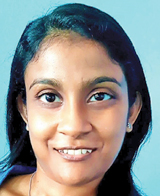
The UN last week, sent a global red signal to its member nations of the severe and lasting impacts of the Covid-19 crisis on young persons. Citing its ILO report “ Youth and Covid-19 impacts on jobs, education , rights and mental well being”, based on the Global Survey on Youth and Covid-19, a study of over 12,000 young persons aged 18-29 conducted across 112 countries, the report stated there was increased anxiety, fear and depression among young persons due to their uncertain future amid the Covid-19 crisis which called for urgent remedial action.
In a country where youth still continue to dominate our 22 million population, the needs of young persons should not be underestimated. Unemployment figures are still high despite our high literacy rates. Many young people still rely on their teachers and peers for information on basic facts of reproductive health. Does the country have the facilities to take the young people forward? Senior Lecturer, Psychiatry Department, University of Sri Jayewardenepura, Consultant Child and Adolescents Psychiatrist, Colombo South Teaching Hospital, Dr Yasodha Rohanchandra answers some of these questions in an interview with the Sunday Observer.
Excerpts
 Dr Yasodha Rohanchandra |
Q. It was reported that a separate Ministry for Youth is to be set up to highlight the needs of young persons in all aspects. Considering the many problems young people in Sri Lanka face today, do you consider this a step in the right direction?
A. Yes, in my opinion this would help in identifying needs that are specific to young people and in the planning, designing and implementation of services for this unique group.
Q. The Covid-19 outbreak and curfew has added to the mental fears and anxieties of young people. Many of them miss their school and daily hang outs with friends. Consequently they become withdrawn and distance themselves from the family. Your comments.
A. Covid-19 has led to school closure and halted extracurricular activities. This has resulted in loss of routine and structure in the lives of children and young people. They have lost the opportunity to meet friends, who may be their main support network.
They have lost the opportunity to engage in play and leisure activities which may be their main mechanisms of stress release. They have also had to adapt to a new way of distance learning within the home environment. The home environment is not an ideal learning environment and parents, who are not experienced in teaching, have had to take up the teachers’ role.
This has led to many conflicts among parents and children. All of these can lead to frustration and increased stress among children and adolescents. Concerns about contracting Covid-19, the health of their family members and worries about the impact of school closure on their academics can cause fear and anxiety.
Q. What are the main mental health problems caused by the current Covid-19 pandemic on youth? Who are most at risk?
A. Stress, anxiety and depressive symptoms are the main mental health problems. In addition, the rates of child abuse have also become alarmingly high. These effects would be much higher in children living in dysfunctional families with parental disharmony and violence. With confinement to home, these children now have no way of leaving the stressful environment or to seek help from other adults.
The other group at risk would be children and adolescents with developmental disorders (e.g. intellectual disability, autism) and preexisting mental health problems. Children with developmental disorders who have special education needs find it difficult to engage in learning via distant education and are more likely to be affected by the lack of routine. They may also have lost access to the specific therapeutic activities they need during the lockdown.
Q. What are the signs to look for in a young person who is mentally adversely affected?
A. Recent onset of irritability and frequent outbursts of temper, lack of motivation to engage in previously enjoyed activities, changes in sleep patterns and appetite and mood changes are common signs. In addition, increased fear and clinginess may be seen in young children.
Q. As we know Covid-19 has also affected older persons especially those living alone and those who miss going out to meet their friends . According to reports from abroad, fatality rates for those over 80 years is much higher in older persons who suffer from depression as a fallout of being under long hours of curfew. Your comments?
A. People who suffer from depression may have higher rates of physical comorbidities. They are also less likely to engage in exercise, and tend to smoke more and neglect their health. All these factors may contribute to the higher mortality in this group.
Q. It has been said that since the outbreak of the Covid-19 pandemic which has affected over 180 countries, several measures and interventions have been put in place by governments to stop the spread of the virus to save lives. However, many of these interventions do not target young people and lack initiatives to assist young people to cope with the threats of Covid-19 . Your comments?
A. The primary focus has been the physical impact of the illness. However, the widespread impact of Covid-19 on young people has now been recognised and several resources made available by the World Health Organization and United Nations, for young people, their caregivers and health care staff.
Q. The lack of easy access to scientific family planning methods and sexual and reproductive health education is another global issue especially in the Asian region. In comparison, Sri Lankan youth to a large extent have more access to such information, via social media. However, this could be dangerous as some electronic programs give the wrong messages. Do you agree?
A. The rates of child sexual abuse have increased dramatically in Sri Lanka. In my day to day clinical experience I have found that a majority of these children are not aware of sexual abuse, the need to protect themselves and some are not aware that sexual encounters can result in pregnancy and sexually transmitted diseases.
Therefore, there is an urgent need to provide age-appropriate sexual education programs. Although they do have access to this information via the internet, the information they receive may not be accurate, age-appropriate or culturally acceptable.
Q. Peer education is often encouraged in certain programs by Non Governmental Organisations on sexual reproduction. Is this a good idea?
A. In my opinion, sexual education is best provided by parents or other adults who are close to the child. The problem with peer education is that the information they provide may not be accurate and may be based on information gathered from unreliable sources. However, if a group of young people who have been especially educated and trained for peer education takes up this task, it may be beneficial.
Q. The impact on Persons with Disabilities - It has been said that women and young girls with disabilities are the hardest hit when it comes to lack of access to sexual and reproductive health, including family planning due to the fact that they are often unaware that they too have a right to make choices about their own health and their own bodies. As we have thousands of disabled young women in Sri Lanka what are your suggestions to solve this problem?
A. Young people with disabilities are highly vulnerable to sexual abuse and exploitation as their understanding of the impact and consequences of sexual relationships is poor. In addition, they may fail to report abuse due to communication difficulties.
Parents and caregivers are also less likely to educate children with disabilities about sex as they believe that the child will not understand.
However, given the high risk of abuse, it is important that young people with disabilities receive the same education about sex and protecting themselves as their peers without disability. But this information needs to be given in a developmentally appropriate language.
Q. What are the government interventions already in place to help mentally disturbed young persons? Are there separate wards in hospitals?
A. There are two specialised inpatient units for children with mental health problems under the age of 13 at the Lady Ridgeway Hospital for children (LRH). Another specialised inpatient unit for adolescents aged 13-18 is available at the National Institute of Mental Health (NIMH). However, as all adolescents needing inpatient care islandwide cannot be transferred to NIMH, and as the unit does not have the capacity to accommodate such a large number, most adolescents are managed in adult Psychiatry wards. Children under 12 years needing admission are often transferred to LRH or sometimes managed in Paediatric wards.
Q. What gaps do you see in our present health system that fail to meet the needs of youth?
A. Mental health services for children and adolescents are still at a primitive level. To date, there are only about 10 child and adolescent psychiatrists in the whole country. There is also a lack of allied health specialists such as psychologists, speech therapists and occupational therapists specialised in caring for children and young people. There is a lack of specialised inpatient units for adolescents with mental health issues.
In addition, services to address child maltreatment and abuse are lacking. There are no proper frameworks to address the needs of young people who have become pregnant as a result of sexual abuse. Due to the lack of the enforcement of the law we find that these perpetrators are often released on bail. Unlike in most other countries there is also no sex offender registry, which would help in reducing recidivism.
Another area that is deficient is services for young people with intellectual disabilities and developmental disorders. Individualised educational plans, vocational training, day centres, respite care facilities and residential care for youth with severe developmental disabilities are limited.
Q. Your message to all young people out there?
A. Adolescence and youth is a period where many physical, emotional, social and ideological changes take place in an individual. This is a period where academic stress, family expectations and peer pressure all come together. Therefore, being an adolescent or a youth can sometimes be challenging and frustrating. Young people often do not seek help for their difficulties as they believe they will not be understood or that they cannot be helped or maybe even due to embarrassment.
However, sometimes it may be difficult to manage your problems on your own and talking to someone often helps. There are people to listen to you and help you.
Therefore if you need anyone to talk to call 1926 helpline of the National Institute of Mental Health, 1333 CCC tele-counselling service or 0112682535 Sri Lanka Sumithrayo.
